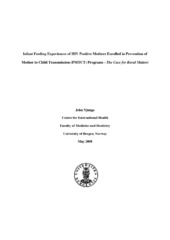| dc.description.abstract | BackgroundThe transmission of HIV from a mother to her child is one of the most tragic aspects of the HIV/AIDS pandemic. For most HIV infected mothers in developing countries, choosing a suitable infant feeding option represent a desperate dilemma. On one hand, health care providers expect mothers to abide by WHO recommended infant feeding choices in order to reduce the risk of HIV transmission to infants. On the other hand, PMTCT enrolled mothers go back home to a society where WHO's recommended infant feeding methods are found to be practically, socially and culturally irrelevant. This study explored infant feeding experiences of HIV positive mothers, their partners and health care workers linked to Prevention of Mother To Child Transmission (PMTCT) of HIV programs in Chiradzulu district, Southern Malawi.MethodsA qualitative study using in-depth semi structured interviews, focus group discussion (FGDs) and case studies was carried at two PMTCT sites. In-depth interviews and focus group discussions were recorded and transcribed. Case studies involved a deeper inquiry into the past, present and situational factors of selected participants. Analysis was done using principles of thematic content analysis. Research findings are presented in the form of a thesis for a Master of Philosophy Degree.ResultsNone of the participants managed to adhere to the WHO prescriptions of infant feeding for HIV positive mothers. Findings revealed wide spread mixed feeding among HIV positive mothers as they yielded to social pressure from a community in which individuals, families and neighbours freely intervened in each others' child rearing activities. Adherence was further challenged by customary use of traditional medicines and prolonged breast feeding practices. One important aspect was that mothers reported that their spouses abandoned them after they had disclosed their HIV positive status; disclosure being a precondition for enrolment in the PMTCT program. In a context of customary matrilineal kinship, matrilocal residence pattern and complete male absence from the PMTCT program; the demand by the PMTCT service for partner disclosure played up fears of rejection among men given accusations of infidelity by the wives' family. This situation forced many men to abandon their families. In the end, affected mothers faced not only the fear of transmitting the virus to their infants, but also the loss of income associated with a departed husband as well as the social disgrace of a ruined family. Community members referred to the PMTCT program as the divorce program'.ConclusionIn large parts of the world, infant feeding is located at the heart of local customs and traditions. The demand by PMTCT programs for essential modification of breast feeding practices are often met with opposition and non adherence. There is an urgent need for PMTCT programs to use cultural competency techniques' in order to remain effective in diverse cultural settings. Equally important is the need for PMTCT programs in this part of the world, to incorporate modules where assessment of potential husband participation is sensitively dealt with from the early stages in the PMTCT process. | en_US |
